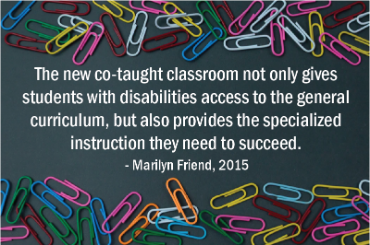As we reflect on this past year of change and adapting to new expectations, and as educators and schools work to recreate themselves, there are a few questions for us to ponder:
- What have we learned while teaching from home? Has this changed our teaching and made us better teachers?
- Have we learned more about our students on a personal level? Has this new knowledge built better relationships and given us a peek into their lives away from school?
- Should we ever go back to the way it was? If not, how can we change to make the learning environment equitable, inclusive, and personalized for everyone involved?
- Can we transform our teaching and student learning?


OSPI's Inclusionary Practices Project Year 2 Update
- The goal of OSPI's Inclusionary Practices Project has been to increase inclusion to 60% statewide and 50% in targeted pilot schools.
- By the end of 2020, we met the statewide target and exceeded the pilot target by 5.5%!
- That means 5,000 students with disabilities in Washington have moved up to the highest level of inclusion!
These are impressive gains made during trying times and it speaks to the resilience and collaborative efforts throughout our state. We are grateful for the efforts of our educators, students and families, and professional development partners, and we are excited to see these collaborative efforts expand inclusion throughout our state!
Take a look at the Year 2 Progress Update for more detailed information.

Building Change Together: Co-Teaching
Co-teaching has been around for over thirty years and is gaining attention as one of the collaborative practices which support successful inclusion. Initially, co-teaching was typically confined to the elementary and middle school levels. However, in recent years, as schools have increased efforts to provide specially designed instruction within the general education classroom, co-teaching has gained traction at the secondary level. It is not the only collaborative model to support students with special needs in the general education classroom, but it is proving effective for all students when it is implemented well.
So, what is co-teaching exactly? Lynne Cook and Marilyn Friend (1995), early pioneers of co-teaching, define it as “two or more professionals delivering substantive instruction to a diverse, or blended, group of students in a single physical space”. In this structure, the two professionals share the instructional planning, the actual instruction, the assessment of learning, and they jointly share the student outcome accountability for all students.

A number of high schools in Washington are using co-teaching in academic classes, and some, like Evergreen and Ridgefield are also including CTE classes. Last summer CCTS interviewed a co-teaching pair from Evergreen and reported on that interview in an article called, Voices from the Field. Heather Heap, a special educator and Darren Benson, a CTE Business and Marketing Teacher shared their experiences with co-teaching and the need to discuss roles, expectations, and strategies to be successful in the classroom.
Supportive Guidelines of Co-teaching
- Six Co-Teaching Models - Definitions and Examples (University of St. Cloud, Academy of Co-Teaching and Collaboration, 2013)
- Common Co-Teaching Challenges (Marilyn Friend, February 2019).
- Co-Teaching and Teacher Collaboration (Teaching in Education, 2019)
- Co-Teaching Part 1 (Maryland Learning Links, 2011)
- Co-Teaching Part 2 (Maryland Learning Links, 2011)
__
Cook, L. and Friend, M. (1995) Co-teaching guidelines for creating effective practices. Focus on Exceptional Children, 28(3), 1-16.
Friend, M. (2015). Welcome to Co-Teaching 2.0. Educational Leadership, 73(4), 16-22.

2021 Events
- IPP Third Thursdays are informal conversations designed to connect with others focused on inclusionary practices, provide technical assistance, and facilitate action plan development.
- Teams of special education and CTE instructors are encouraged to attend together.
- To access materials from previous events, visit the IPP Resources page.
Co-teaching with CTE
Feb. 18, 2021; 3-4 p.m. PST
One of the most common strategies for inclusion is co-teaching, in academic and CTE classrooms. What does co-teaching look like in CTE classrooms? What practices support its effectiveness, and what pitfalls should be avoided? Join us for an informal conversation to share your strategies and learn from the best practices of other educators.
Register for IPP Third Thursday on 02/18/2021 - Co-teaching with CTE
Collaboration
March 18, 2021; 3-4 p.m. PDT
Quality collaboration improves student outcomes and improves educators. What strategies do you find effective for collaboration? How does your team find time for quality collaboration? Join us for an informal conversation to share your strategies and learn from the best practices of other educators.
Register for IPP Third Thursday on 03/18/2021 - Collaboration
Designing the Change
April 22, 2021; 3-4:30 p.m. PDT
Designing the Change is the culminating seminar of the 2020-21 CCTS Inclusionary Practices Project, focusing on increasing inclusionary practices in general education and partnerships between Special Education and CTE classrooms.
Guided by a panel of professionals in the field, participants in this seminar will work through the Managing Complex Change process and design a plan to implement increased inclusionary practices. Wherever you are on your inclusionary practices journey, we hope you will join us!
Participation in previous IPP seminars is not a requirement to attend. For your reference, presentation materials from Seminar 1: Catching the Vision, and Seminar 2: Voices from the Field, are available on the CCTS Inclusionary Practices Resources page.
Planning for Next Steps
May 20, 2021; 3-4 p.m. PDT
With this year ending and the beginning of next year in sight, what is your plan to increase inclusive efforts in your classroom, your school, your district? How will you develop, or enhance a culture of inclusion? What structures need to be put into place? What skills need to be developed? Is there a practice you want to implement? Join us for an informal conversation to share your strategies and learn from the best practices of other educators.
Register for IPP Third Thursday on 05/20/2021 - Planning for Next Steps

Past Training Materials and Recordings
Slide decks and captioned recordings from CCTS trainings are available online under Inclusionary Practices Resources. Topics include:
- Accommodations 101
- Aligning High School and Beyond Plans and IEPs
- CTE and Special Education Partnerships
- Effective Collaboration
- Finding Your CTE Data
- T-Folio 101+
- ...and more!

Don't miss the latest CCTS IPP updates!
